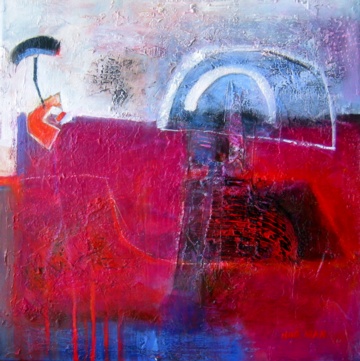| The Machine Awakes Stephen Andrew Taylor, 2007/2009 words by Richard Powers from the novel Galatea 2.2 first performance: March 7, 2009, Urbana. Sinfonia da Camera with Amy van Roekel, conducted by the composer mp3 (11:18) Also available on the album The Machine Awakes (Albany Records), 2010. |
"Lookout" by Hua Nian |
Dogs bark. Birds soar. Night falls. You vanish. Father hugs. Baby cries.
Fish? Fish sky. Shines? Hope shines. Forests floor. Laugh efforts. Combs loneliness.What seas what shores what grey rocks and what islands.
Tuning forks and pitchforks and forked tongues and the road not taken.
Resistors and capacitors, baiters and switchers, alternating current, alternate lifestyles.Wool and linen and damask. Finches and feeders. Bats and banyans.
Mites and motes, insect galls and insecticides. Mating for life or a fraction of a minute.Defecation and respiration and circulation. Dying of heart disease. Divining with a fresh-cut alder rod.
The Great Wall and the Burma Road and the Iron Curtain and the Light at the End of the Tunnel.
How the earth looks from space.But where shall my soul repose?
Revenge and forgiveness and contrition. Bar codes and baldness. Sonar and semaphores.
Lint, lintels, lentils, Lent. Grace and disgrace and second chances. Suicide. Euthanasia.
First love, love at first sight.What do I look like? What do I look like, Richard? Please. Show me.
Program Note
The 1995 novel Galatea 2.2 tells the story of a fictional novelist, Richard Powers, returning to the fictional Illinois college town of U. after living in the Netherlands for many years. The novelist collides with cognitive scientists and enters into a race to train a neural network—a gradually evolving digital consciousness named Helen—to read literature and respond to it at the level of a sophisticated college student. The novel is an autobiography, the story of a writer’s return home, halfway through life’s journey. At the same time, it is the latest version of the oldest and most impossible fable: the story of the attempt to bring inanimate matter to life. Above all else, though, it is an extended, profound and delightful meditation on reading and writing, personal and collective memory, the constantly changing canon of cultural value, and the acts of improvised narrative that join us all.
In 2006, I contacted Mr. Powers about setting to music the words of Helen,
the infant but growing computer intelligence. He was very kind, giving not
only permission but encouragement and expert advice (even suggesting the title,
which is perfect). American Opera Projects in New York City had asked me to
compose an aria for the coloratura soprano Amy van Roekel, and Helen was an
irresistible subject. Under the tutelage of the fictional Richard, music becomes
a vital part of Helen’s education. As soon as she is able (and this
transition from “Implementation H” to the self-aware Helen is
one of the most magical parts of the story), she starts asking to hear certain
music over and over: among her favorites are Mozart’s Clarinet Concerto
and Purcell’s “Evening Song.” In The Machine Awakes, these
and other works from the past are gradually conjured into existence, like
radio distortion resolving into pure signal. Similarly the libretto compresses,
into a few minutes, the training of Helen’s evolving consciousness from
earliest digital chirps and whirs to full-fledged self-awareness. As Mr. Powers
writes, “We train our machine prosthetics to hear the shape of our desire;
in the process, they lead us to hear, in new ways, how those old sounds have
trained us.”
The chamber orchestra version of The Machine Awakes was commissioned
by Sinfonia da Camera, and is dedicated to them and their Music Director Ian
Hobson. - Stephen Taylor
Last updated April 12, 2014 by Stephen Andrew Taylor, [email protected]
